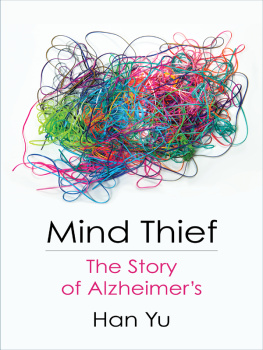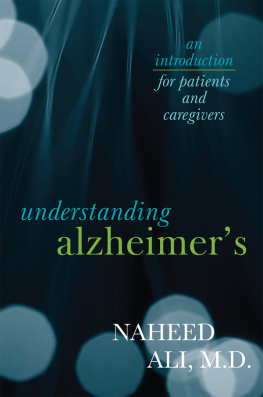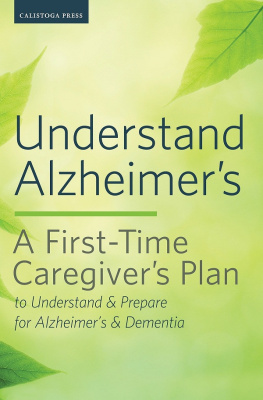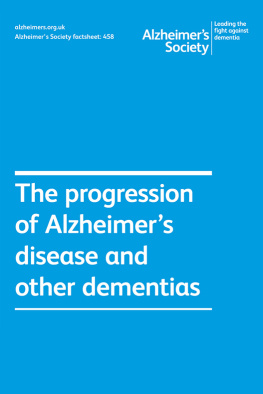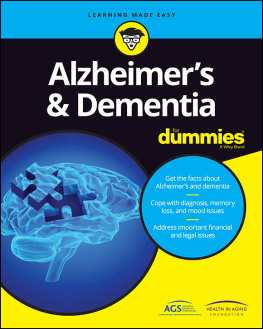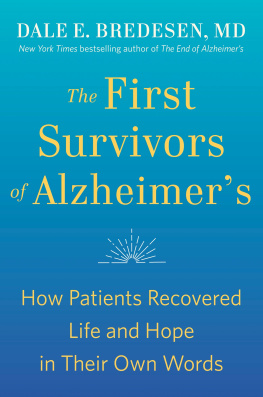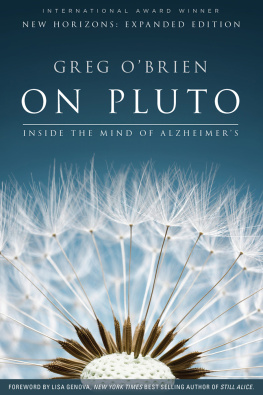Table of Contents
Mind Thief
Mind Thief
The Story of Alzheimers
Han Yu
Columbia University Press
New York
Columbia University Press
Publishers Since 1893
New YorkChichester, West Sussex
cup.columbia.edu
Copyright 2021 Han Yu
All rights reserved
E-ISBN 978-0-231-55276-9
Library of Congress Cataloging-in-Publication Data
Names: Yu, Han, 1980 author.
Title: Mind thief : the story of Alzheimers / Han Yu.
Description: New York : Columbia University Press, [2021] |
Includes bibliographical references and index.
Identifiers: LCCN 2020019015 (print) | LCCN 2020019016 (ebook) |
ISBN 9780231198707 (hardback) | ISBN 9780231552769 (ebook)
Subjects: LCSH: Alzheimers disease. | Alzheimers diseaseHistory.
Classification: LCC RC523 .Y8 2021 (print) | LCC RC523 (ebook) |
DDC 616.8/311dc23
LC record available at https://lccn.loc.gov/2020019015
LC ebook record available at https://lccn.loc.gov/2020019016
A Columbia University Press E-book.
CUP would be pleased to hear about your reading experience with this e-book at .
Printed in the United States of America
Cover design: Milenda Nan Ok Lee
Cover art: Spiderplay iStock
Contents
E very 65 seconds in the United States, a person develops Alzheimers. Every three seconds in the world, a person develops dementia, mostly due to Alzheimers.
In 2019, 5.8 million Americans lived with Alzheimers. By 2050, 13.8 million will. By the same year, 131.5 million people worldwide will be living with dementia.
In the United States, death from Alzheimers increased more than 120 percent over the last twenty years. It is now the sixth-leading cause of death. Worldwide, Alzheimers and other dementias are the fifth-leading cause of death.
In 2019, it cost $350,000 to care for one American with dementia. That year, the total cost of Alzheimers and other dementias was $290 billion in the United States and over $1 trillion in the world.
Still higher is the human cost of Alzheimersthe loss of friends and families, memories and purposes, lives and souls.
At present, there is no effective prevention or treatment, let alone cure, for Alzheimers.
As a species, we desperately need to do something.
I thank my agent Kate Johnson at MacKenzie Wolf for her steadfast support, superior work ethic, keen eyes, and literary smartness.
The very same goes to my editor Miranda Martin at Columbia University Press.
These two brilliant women recognize the value of lost histories and silenced voices. They appreciate the humanistic in science and the emotional in facts. They look beyond the artificial division between experts and laypeople. They advocate for non-Western, non-masculine authors. Working with them has been an absolute pleasure.
Thanks also go to my colleague Deborah Murray, who introduced me to the charming Meadowlark retirement community; my colleague Elizabeth Dodd, who gave me invaluable insight in conceiving a big picture for the book; and my colleague Katherine Karlin, who patiently read proposal and chapter drafts, encouraged, guided, and helped in every way she could. I am very lucky to have you all in my life.
Thank you, too, to the very capable editorial and production team at Columbia University Press and its partner who saw this book through various stages of production: Brian Smith for tying up various loose ends, Ben Kolstad and Sue McClung for copyediting, Leslie Kriesel for coordinating, and other behind-the-scene folks. Your professionalism inspires me.
And, of course, thank you to my husband, who puts up with my long hours bound to the desk, who never hesitates to challenge me, and who is prouder of me than I am of myself.
I n 1864, a sprawling structure was rising on the outskirts of Frankfurt, Germany. Emulating the medieval gothic style, the structure had imposing towers, an arched entryway, and enormous windows. It was by all architectural accounts an impressive building. Yet, as the home of the Institution for the Mentally Ill and Epileptics, it felt more depressive than impressive under the gloomy Frankfurt sky. Among the locals, it was known as the Castle of the Insane.
Stumbling through the door of the castle in the winter of 1901 was a local woman, Auguste Deter, fifty-one years old. Auguste was tall, with long brown hair. One could tell she had been handsome in her youth, and she still was, except that her dark eyes looked confused and helpless. Standing by her side was her husband, Karl. Auguste had no idea where she was, or, really, who she was.
One of four children, Auguste was born and raised in Kassel, Germany. Her father died young, supposedly from a skin infection, and her mother died at sixty-four of pneumonia. At age twenty-three, Auguste tied the knot with Karl Deter. Together, they moved to Frankfurt, where Karl worked as a railway clerk. For the next twenty-eight years, Auguste proved herself a hardworking and amiable wife, maintaining the household, tending her husband, and raising a healthy daughter.
But Auguste hadnt been herself lately. She neglected housework and messed up her cooking. She had trouble remembering things. She was paranoid that others were plotting against her. She wandered around paying unwanted visits to neighbors. She even grew suspicious of Karl, accusing him of having an affair with a neighbor.
Humiliated and helpless, Karl brought Auguste to their family doctor. Noting Augustes memory problem, manic state, and sleeplessness, the doctor decided that she was suffering from general paresis. Common at the time, general paresis was a feared condition that led to mental deterioration, personality change, and ultimately death. Today, it is known as neurosyphilis, a disease caused by bacterial infection in the brain and nervous system. With the advent of penicillin as a treatment, it is no longer lethal. But in 1901, there was no penicillin, nor was there a clear understanding of the cause of the disease. The family doctor declared Augustes case hopeless and ordered that she be sent to a mental institution: the Castle of the Insane.
Despite its fearsome name and severe appearance, what went on inside the Castle of the Insane was more heartening. Established under the direction of Heinrich Hoffmann, a psychiatrist better known to some as the author of the popular childrens book Der Struwwelpeter (Shockheaded Peter), the hospital operated based on Hoffmanns belief that mental illness is a true disease. Mental patients are not morally corrupt, weak, or possessed. As with other patients, their suffering has a physical origin: a damaged brain, something less visible than a broken limb or gashing wound. If anything, mental patients need the gentlest and most humane care because their illness is of the most devastating type.
Acting on this belief, the institution banned straitjackets and gave patients as much freedom as possible. Coercive measures were avoided, and isolation was employed only as a last resort. Widely used instead was bath therapy. Patients lay in bathtubs immersed in warm water for hours, or even days, to help soothe themselves. They were also encouraged to exercise, garden, and listen to music.
Poor Auguste, however, didnt get to enjoy the amenities much. She was too far along in her confusion and agitation. Upon her arrival at the institution, she was unable to recall her name, her husbands name, or even that she had a husband. If Karl Deter had had any hope before, he realized that day that his wife of twenty-eight years was gone.

